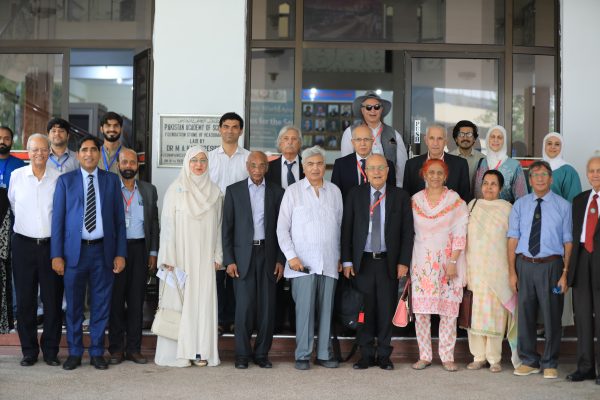The 25th Conference of the Islamic World Academy of Sciences (IAS) on Water-Energy-Food-Ecosystem Nexus for the Security of the OIC Countries (22-24 July 2024)

Pakistan Academy of Sciences (PAS) in collaboration with the Islamic World Academy of Sciences (IAS) organized the 25th Conference on “Water-Energy-Food-Ecosystem Nexus for the Security of the OIC Countries”, from July 22-24, 2024 at the PAS Auditorium, Islamabad. Prof. Dr. Kauser Abdulla Malik, President PAS; Prof. Dr. M. Aslam Baig, Secretary General PAS; and Prof. Dr. Tasawar Hayat, Senior Fellow PAS (Chief Organizers), addressed and welcomed the conference delegates and participants. Prof. Dr. Adnan Badran, President, IAS; was invited as a Guest of Honor, and Ms. Taghreed Saqer, Executive Secretary, IAS; and Ms. Najwa Daghastani, Programs Manager, IAS; also played a significant role in the organization of this conference. Syed Yousaf Raza Gillani, Chairman Senate, and Sherry Rehman, Member Senate, were invited as the Chief Guests at the occasion.
The main objective behind the organization of this conference was to unite leading international and national experts, academicians, researchers, policymakers, and industrial professionals to exchange knowledge, research findings, and practical solutions regarding the pressing challenges and issues related to the “Water-Energy-Food-Ecosystem Nexus” for the security of the OIC Countries.
Over 140 scientists, academicians, scholars, industrialists, and policymakers from Pakistan and 13 delegates from OIC countries including Bangladesh, Jordan, Lebanon, Malaysia, Palestine, South Africa, Sudan, and Uzbekistan, attended the event physically and or virtually. The local invited speakers, academicians, and participants of this conference included those from Quaid-i-Azam University, Islamabad; Federal Urdu University, Islamabad; University of Peshawar; University of Karachi; University of Agriculture, Faisalabad; Government College University, Lahore; Peshawar University; National University of Science and Technology, Islamabad; PMAS-University of Arid Agriculture, Rawalpindi; Forman Christian College, University, Lahore; and others.
In total, 25 lectures were presented by eminent local and foreign speakers in seven (7) Technical Sessions of this Conference The first Technical Session was devoted to 3 Key Note Lectures on the subjects of (a) Higher Education, Science and Technology Imperatives for Socio-economic Development; (b) Managing Water-Energy-Food Security-Ecosphere Nexus; and (c) Role of Renewable and Nanotechnologies in Energy Security in the 21st Century. The 4th Technical Session was devoted to three thematic lectures: (a) Integrated Water Resources Management for Sustainable Agriculture; (b) Renewable Energy Solutions for Sustainable Food Production; and (c) Enhancing Food Security through Ecosystem-Based Approaches. In the remaining 5 Technical Sessions, lectures were delivered on topics ranging from challenges and opportunities in achieving SDGs, Biodiversity Nexus and Security, biochar innovation for enhancing food security and ecosystem health, the impact of size and thickness of performance of nanoparticles, malnutrition, and dementia among elderly in OIC Countries, the impact of local stress and external shocks on food systems, good water governance through the integration of science with socio-cultural dimensions, Influencing policy and practice for enhancing groundwater quality, identification of rare-earth elements in Northern Pakistan, the impact of pollutants on human health and climate change, the impact of industrial revolution on environment, climate triggered threats, global warming and climate change triggered threats, and many others.
During the concluding session, Prof. Dr. Kauser Abdulla Malik, Prof. Dr. M. Aslam Baig, Prof. Dr. Tasawar Hayat, and Prof. Dr. Adnan Badran, thanked the IAS delegates from OIC member states, IAS Fellows, PAS Fellows, Invited Speakers, and the participants. Prof. Dr. Tasawar Hayat highlighted the several benefits of this IAS conference for the OIC Member States, such as:
- Access to Enhanced Knowledge and Expertise
- Exposure to International Best Practices and Innovative Solutions
- Policy Development and Viable Implementation Plans
- Development of Regional Collaboration and Networking
- Development of Long Term Sustainable Strategies for Better Preparedness and Management against issues related to the “Water-Energy-Food-Ecosystem Nexus”.
While addressing the concluding session, Prof. Tasawar Hayat said that there is a dire need to address issues of the “Water-Energy-Food-Ecosystem Nexus” for the Security of the OIC Countries and this can be achieved through collaborative thinking and planning both at the local and the OIC regional level to mitigate these issues.


